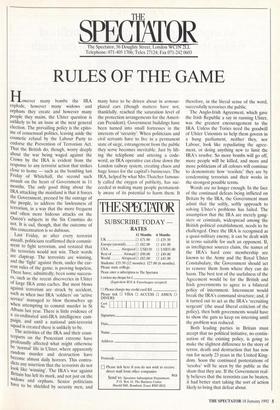The Spectator, 56 Douifity Street, London WCIW2LL Telephone: 071-405 1706;
Telex 27124; Fax 071-242 0603
RULES OF THE GAME
However many bombs the IRA explode, however many widows and orphans they create and however many people they maim, the Ulster question is unlikely to be an issue at the next general election. The prevailing policy is the epito- me of consensual politics, leaving aside the cosmetic refusal by the Labour Party to endorse the Prevention of Terrorism Act. That the British do, though, worry deeply about the war being waged against the Crown by the IRA is evident from the response to any terrorist action that strikes close to home — such as the bombing last Friday of Whitehall, the second such assault on the heart of Government in 11 months. The only good thing about the IRA attacking the mainland is that it forces the Government, pressed by the outrage of the people, to address the lawlessness of terrorism, in a way that the more frequent and often more hideous attacks on the Queen's subjects in the Six Counties do not. It is sad, though, that the outcome of this concentration is so dubious.
Last Friday, as after every terrorist assault, politicians reaffirmed their commit- ment to fight terrorism, and restated that the terrorists would not win. Their words are claptrap. The terrorists are winning, and the `fight' against them, under the cur- rent rules of the game, is proving hopeless. There have, admittedly, been some success- es, such as the recent discoveries in Ulster of large IRA arms caches. But most blows against terrorism are struck by accident, such as when two IRA 'soldiers' on 'active service' managed to blow themselves up when attempting to commit murder in St Albans last year. There is little evidence of a co-ordinated anti-IRA intelligence cam- paign, and until a national anti-terrorist squad is created there is unlikely to be. The activities of the IRA and their coun- terparts on the Protestant extreme have profoundly affected what might otherwise be 'normal' life in Ulster, where apparently random murder and destruction have become almost daily horrors. This contra- dicts any assertion that the terrorists do not look like `winning'. The IRA's war against Britain has left its mark, and not just on the widows and orphans. Senior politicians have to be shielded by security men, and many have to be driven about in armour- plated cars (though matters have not, thankfully, reached the saturation level of the protection arrangements for the Ameri- can President). Government buildings have been turned into small fortresses in the interests of `security'. When politicians and civil servants have to live in a permanent state of siege, estrangement from the public they serve becomes inevitable. Just by lift- ing the telephone and uttering a code- word, an IRA operative can close down the London railway system, creating chaos and huge losses for the capital's businesses. The IRA, helped by what Mrs Thatcher famous- ly called the oxygen of publicity, has suc- ceeded in making many people permanent- ly aware of its potential to harm them. It therefore, in the literal sense of the word, successfully terrorises the public.
The Anglo-Irish Agreement, which gave the Irish Republic a say in running Ulster, was the greatest encouragement to the IRA. Unless the Tories need the goodwill of Ulster Unionists to help them govern in a hung parliament, neither they, nor Labour, look like repudiating the agree- ment, or doing anything new to limit the IRA's resolve. So more bombs will go off, more people will be killed, and more and more politicians of all colours will continue to demonstrate how `resolute' they are by condemning terrorists and their works in the strongest possible terms.
Words are no longer enough. In the face of the continued defeats being inflicted on Britain by the IRA, the Government must admit that the softly, softly approach to solving Ulster's problems has failed. The assumption that the IRA are merely gang- sters or criminals, widespread among the British political establishment, needs to be challenged. Once the IRA is recognised as a quasi-military enemy, it can be dealt with in terms suitable for such an opponent. If, as intelligence sources claim, the names of the IRA's hard core membership are known to the Army and the Royal Ulster Constabulary, the Government should act to remove them from where they can do harm. The best test of the usefulness of the Agreement would be for the British and Irish governments to agree to a bilateral policy of internment. Internment would break the IRA's command structure; and, if it turned out to act as the IRA's `recruiting sergeant' (the usual liberal criticism of the policy), then both governments would have to show the guts to keep on interning until the problem was reduced.
Both leading parties in Britain must accept that no political initiative, no contin- uation of the existing policy, is going to make the slightest difference to the story of terror, death and destruction that has now run for nearly 23 years in the United King- dom. Soon the continued protestations of `resolve' will be seen by the public as the sham that they are. If the Government real- ly believes that the terrorists can be beaten, it had better start taking the sort of action likely to bring that defeat about.


















































 Previous page
Previous page